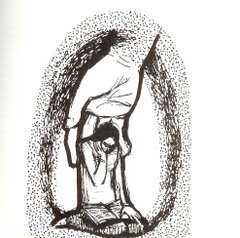Life of the Beloved (2)
According to Nouwen, the second movement in becoming the beloved is that of hearing and claiming the "Blessing". To give a blessing is to affirm, to say, "Yes" to a person's belovedness. A blessing touches the original goodness of the other; and calls forth his or her belovedness. God blesses those he has "Chosen" (the first movement). God's blessing rests on us from all eternity and it is the deepest affirmation of our true self. It is not a blessing for something we do but for who we are in God's eyes. I suppose I understand this in the way a parent sees their child - as loved, and deeply accepted (this is different from approval), irrespective of what the child does or does not do.
The spiritual disciplines that help us practice this movement are : firstly, prayer - to become silent and listen to the Voice that dwells deep within. This is not an easy task because the movement of God's Spirit is very gentle, often hidden, yet also persistent and deep. The voices of the world that says we are not good enough, are not blessed because we have not succeeded in certain ways, are often loud, seeking attention. The second way is the cultivation of 'presence' - being attentive to the blessings that come our way. In a world where big and best and powerful rule, we need to be disciplined to receive and give thanks for the simple yet meaningful gifts of God. As Nouwen shared, living with people with disabilities helped him grow more aware of the gifts that are always there, though hidden from those of us who demand the spectacular from God. When we bless others, are we able to speak of the core of who they are, rather than their abilities? Nouwen prayed for one of the helpers at L'arche ".....it is so good that you are here. You are God's beloved...Your presence is a gift and joy for us. When things are hard and life is burdensome, always remember that you are loved with an everlasting love". I would really long to receive such a prayer - one that celebrates my being - ness, rather than the utilitarian way of blessing me for my 'ministry', (my good works etc). Perhaps this prayer comes more and more naturally when we ourselves are learning to live the life of the beloved.






+223.jpg)


























No comments:
Post a Comment